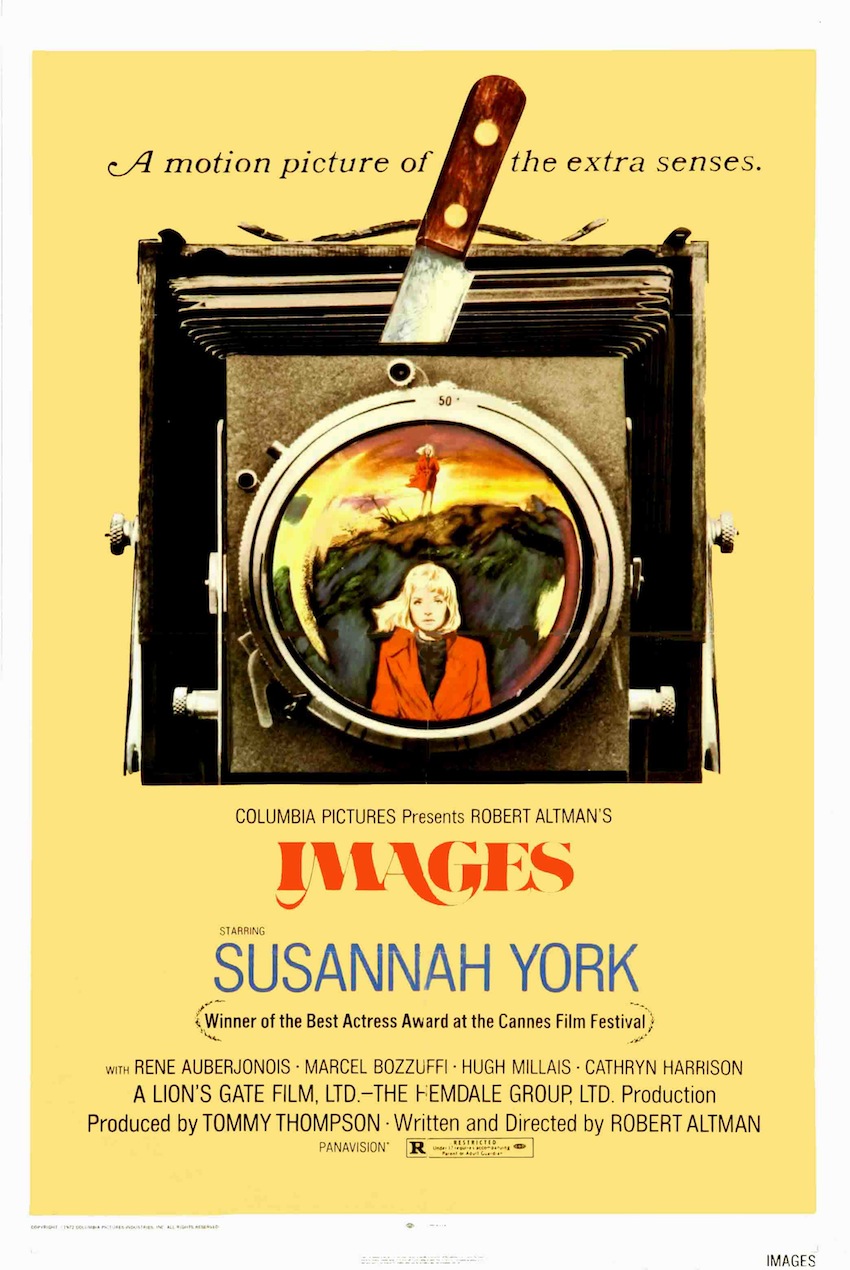
IMAGES
UK, 1972, 102 minutes. Colour. Susannah York, Rene Auberjonois, Marcel Bozzuffi, Cathryn Harrison.
Directed by Robert Altman.
Images is an unusual film. The title implies pictures, reflection, imaginings and the film utilises all these meanings in its own images. The film is a project of Robert Altman's, who has achieved a certain amount of success and controversy with M*A*S*H, Brewster Mc Cloud and Mc Cabe and Mrs Miller, The Long Goodbye, Thieves Like Us He has become an important director.
Images is a very subjective film in so far as it is an exploration of a theme by Altman. It is also an exploration of the mind of the heroine, Catherine. The exploration of the mind is the stronger because Catherine is on the verge of some kind of breakdown or is, in fact, schizophrenic. This makes for complex images which require a great deal of thought.
Susannah York helps to make the film successful through the warmth of her personality. Otherwise, it might have been a very cerebral exercise in cinema experimentation. A film for specialists.
1. Did you like this film? Why? What was the basic meaning of the title, pictures, reflections, imagination, pictures made by cameras? Were these meanings relevant? What other meanings are there of 'images'?
2. The importance of the style of the film - Panavision, rich colour, use of music rhythms of the images, hallucinations, realism? The children's story about the unicorn as a chorus for the film?
3. The atmosphere of the decor - the New York fashionable apartment to the holiday atmosphere (Irish scenery), the remote house, the town, countryside?
4. Catherine as the central character, the images were hers, the images of Catherine are ours. The importance of Susannah York's personality coming through the character? Catherine as an ordinary person, as a housewife on the verge of disintegration? Catherine in New York, her suspicions, going on holiday, her happiness? The second Catherine watching the real Catherine (which was the real Catherine?). The effect of the holiday on Catherine - her present going into her past, into her imagination? Her inability to distinguish what was real? Her relationship to Hugh, memories of Rene, the role of Marcel in the film? Susannah as an image of Catherine when she vas young? Catherine's relation to all these people? What was happening in her mind, the result of the violent fantasies? The final impact of the second Catherine watching her? With the car, Catherine refusing to give her a lift? The final violence, what was Catherine trying to destroy? On reflection what do you understand about Catherine as a person?
5. The importance of the trip for both, and the result of this on them? What kind of trip was it for Catherine, away from reality to unreality or vice-versa? Why did the second Catherine appear on the mountainside? Which one went down to the house, or were they both two parts of the one Catherine, symbolising schizophrenia? The re-appearance of the second Catherine?
6. Rene - what kind of person had he been? Catherine's relationship to him? Why was he so vivid in her images? Did he love her and she him? Why did he taunt her, what was the truth he told her and why did she destroy him?
7. Hugh - an ordinary business man, as a husband, as loving Catherine, on holiday, his love of shooting, his reactions to Catherine's strangeness? What did he know of her past? His relationship to Marcel? Why was he finally destroyed? Was he unfaithful to Catherine at any time?
8. Marcel - Catherine's relationship to him? Was it a deep involvement, erotic? How much of this relationship was only in Catherine's mind? What was she trying to destroy in Marcel? What was your reaction when you found he was still alive? {The meaning of the confusion as to who went off in the car after the evening in the home?).
9. The importance of Susannah in the film - as a girl, image of Catherine, daughter to Marcel? The relationship between Catherine and Susannah? The place of the jigsaw puzzle and its symbolism?
10. Why was Catherine afraid? Why did she talk to herself? Did she understand what was happening to her?
11. The importance of the violence. What does this say about ordinary life, madness, violence?
12. Was it possible for Catherine to exorcise the evil in her? Why did it overwhelm her?
13. How did the film visually give insight into the nature of madness, truth, appearances?
14. How does this film symbolise the modern person who is unable to cope with reality?
15. This film was praised as a classic, and criticised as pretentious. How do you see the film? Was it a valuable film?